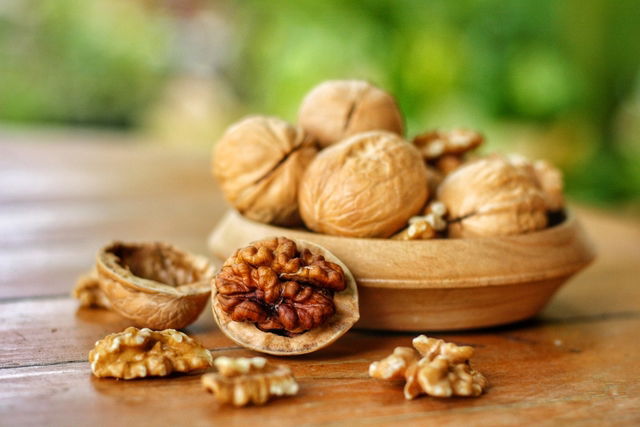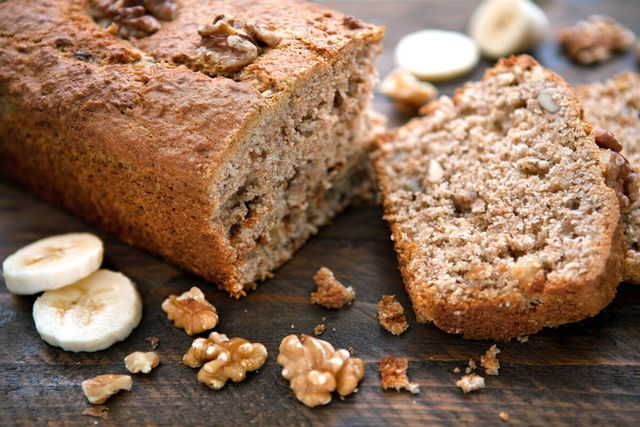Walnuts are oilseeds that are rich in omega-3 and polyphenols, which contain antioxidant and anti-inflammatory action. They can help to decrease "bad" cholesterol and manage blood pressure, as well as prevent health conditions like atherosclerosis, high blood pressure and a heart attack.
Walnuts are high in calories, but they can still aid in weight loss and diabetes control as they are also high in protein and fiber. This means walnuts can keep hunger at bay and help keep sugar levels within normal limits.
Walnuts can be consumed raw or toasted in yogurts or together with fruits. They are also commonly used in recipes for cakes, tarts, salads, bread, plant-based milk, pudding and granola.

Health Benefits
The main health benefits that walnuts can provide include:
1. Preventing cardiovascular disease
Walnuts are rich in omega-3, a type of healthy fat that promotes the reduction of total cholesterol and "bad" LDL cholesterol. They can also increase "good" HDL cholesterol levels. As such, walnuts can help to prevent cardiovascular diseases, like atherosclerosis, heart attack or a stroke.
The polyphenols in walnuts, particularly ellagic acid, contain anti-inflammatory and antioxidant properties that boost endothelial tissue function. This tissue lies the inner blood verssels, and improved function means it can be cardiovascular-protective. .
2. Preventing neurodegenerative disease
The polyphenols present in walnuts have potent anti-inflammatory and antioxidant that prevent cellular damage in the brain. They can improve neuron function and protect the brain from toxic compounds, preventing the development of neurodegenerative illnesses like Alzheimer’s and Parkinson’s.
Walnuts are also rich in omega-3, a nutrient that is very important for brain functioning. This can boost your learning ability, attention and memory.
3. Preventing cancer
Walnuts contain tocopherols and polyphenols, which are bioactive compounds with antioxidant and anti-inflammatory properties. These can protect healthy cells from damage and prevent the multiplication of cancerous cells, making it a great complement to the treatment of advanced prostate, breast, colon or kidney cancer.
4. Improving intestinal function
Because they are rich in fiber, polyphenols and omega-3, walnuts have prebiotic capabilities. They can stimulate the growth of healthy bacteria in the gut, improve intestinal function and prevent constipation. They are also associated with a reduced risk of colon cancer.
5. Managing diabetes
Consuming walnuts on a daily basis can help to control diabetes as these nuts are rich in fiber and omega-3. These nutrients improve how insulin works to manage blood sugar levels.
6. Aiding in weight loss
Although walnuts are high in calories, moderate consumption can aid in weight loss. Walnuts are rich in fiber, healthy fats and protein, which are nutrients that help to keep you full and reduce hunger pangs throughout the day.
Weight loss can only be achieved, however, if walnuts are incorporated into a healthy, balanced diet and an active lifestyle.
7. Managing blood pressure
Walnuts are rich in polyphenols and unsaturated fat, which are nutrient that contain anti-inflammatory action. These nutrients can contribute to endothelial health and promote optimal blood flow to control blood pressure.
In addition, this nut contains great amounts of magnesium, which is a mineral that triggers vasodilation, which is why it can be a great complement to hypertension treatment.
8. Decreasing inflammation
Walnuts are one of the oil seeds with the most omega-3. This nutrient can decrease inflammation, making it a great addition to the treatment of inflammatory bowel disease and rheumatoid arthritis, for example.
This benefit is possible because omega-3 decreases the eicosanoids and cytokines in the body, which are substances that trigger inflammation
9. Boosting muscular performance
This nut can improve muscular performance because it contains polyphenols and omega-3. These nutrients help to decrease muscular inflammation that follows moderate exercise, as well as improve recovery and post-workout pain.
Walnuts are rich in protein that promote muscular growth, and can therefore be consumed pre- or post-workouts.
10. Preventing early aging
The antioxidants in walnuts help to reduce cellular damage caused by free radicals, preventing early aging.
This nut is also rich in omega-3, a nutrient that keeps the skin healthy, soft, hydrated and firm, It can help to prevent the emergence of wrinkles and flaccidity.
Nutritional information
The following table outlines the nutritional values in walnuts:
To obtain the health benefits that walnuts have to offer, they should be consumed as part of a healthy, balanced diet and incorporated into an active lifestyle.
How to consume
Walnuts can be eaten raw or toasted, either alone or added to yogurt, fruit or salads. Walnuts can also be used in various recipes for cakes, sauces, bread, pudding, tarts, pancakes or granola.
To obtain the health benefits of walnuts, you should aim to eat one portion per day, which is equivalent to 28 g or 5 or 6 walnuts. However, the recommended daily amount may vary with your age, sex and health status.
Contraindications and other cautions
Walnuts should not be eaten by anyone allergic to them or any other nuts, like peanuts, hazelnuts, almonds, pistachios, Brazilian nuts or cashews.
Children under 5 can eat walnuts as long as they are ground up finely or under the supervision of their guardians to prevent choking.
Healthy walnut recipes

Some healthy walnut recipes you can try are:
1. Oat and walnut cake
Ingredients:
- 1 cup of whole grain flour
- 2 cups of ground oats
- 3 eggs
- 4 tablespoons of sweetener power
- 1 cup of skim milk or plant-based milk
- 1 tablespoon of baking powder
- ½ cup of chopped walnuts
- 1 tablespoon of butter
How to prepare:
Preheat the oven to 350 ºF (or 180 ºC) and grease a baking pan with butter and flour. Using an electric mixer, beat the egg whites until fluffy and set aside. In a separate bowl, use the electric mixer again to beat the sweetener and butter for about 5 minutes. Add the milk and beat for another 3 minutes. Add the oats and flour, and beat for a few more minutes.
Gently mix in the baking powder and the egg whites. Transfer this batter to the pan and bake for 35 to 40 minutes. Wait for the cake to cool, then serve.
2. Spinach and walnut salad
Ingredients:
- 200 g of fresh spinach
- 2 big mushrooms (or 3 small)
- 1 handful of walnuts
- 1 handful of sunflower seeds
- 30 g of mozzarella cheese
- 6 tablespoons of olive oil
- 2 tablespoons of mustard
- 2 tablespoons of honey
- The juice of 1/2 lemon
- 1 tablespoon of apple cider vinegar
- Salt and pepper to taste
How to prepare:
Wash the spinach and mushrooms thoroughly and set aside. Prepare the vinaigrette by mixing the olive oil, mustard, honey, lemon juice, salt and pepper. Stir until well-combined. Then, slice the mushrooms and cut the cheese into small cubes. Place a layer of spinach on the plate, then add the mushrooms, cheese, nuts, sunflower seeds and vinaigrette over the leaves, and serve
